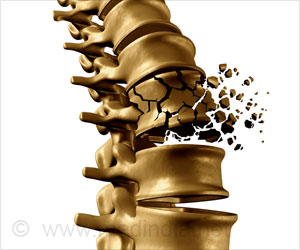Elevated levels of a certain chemokine, a small signaling protein, that promotes the formation of bone-destroying cells in the blood, were linked with a higher risk of hip fracture in men, according to new research published in the Journal of Bone and Mineral Research.
How Does Osteoporosis Affect Bone Health?
Bone health requires a balanced activity of various bone cell types including bone-forming osteoblasts and bone-resorbing osteoclasts. Osteoporosis occurs when osteoclasts dominate without adequate bone formation to compensate.
In the elderly, hormone reduction during aging accelerates the bone-resorbing activities of osteoclasts, leading to higher rates of bone turnover and increased incidence of fractures in older adults. Hence, regulatory mechanisms of osteoclast differentiation play an important role in the pathogenesis of osteoporosis[1].
‘Early interventions targeting signaling of protein that promotes formation of bone destroying cells could be beneficial in preventing hip fractures in older men.’
Chemokines or chemotactic cytokines are small signaling cytokines critically involved in these processes. CXCL9 and CXCL10 have been specifically implicated in different bone modulating pathways.
Despite promising experimental data, no human study has validated an association between these chemokines and osteoporosis or fracture risk.
Hence, in the present study, researchers assessed whether levels of CXCL9 and CXCL10 were elevated in human serum samples of older adults who had incident hip fractures in a prospective, population-based study of older Chinese in Singapore.
Is Osteoporosis Worse for Men?
The study included 55 men and 119 women who had experienced a hip fracture an average of 6.3 years after their blood was collected. The participants were matched individually to controls of who did not develop hip fractures.
Advertisement
Investigators observed higher blood levels of the chemokine CXCL9 in the pre-fracture blood samples of men with subsequent hip fractures compared with their non-fracture controls. No such difference was seen in women[2].
This unexpected difference in the results between men and women in the study may be explained by how changes in sex hormone levels during aging could influence the level and effects of CXCL9 differently in older men and women.
The new findings open an exciting possibility that early interventions targeting CXCL9 or CXCL9-CXCR3 signaling could be beneficial in preventing hip fractures in older men.
References :
- 1. Cauley JA, Cawthon PM, Peters KE, Cummings SR, Ensrud KE, Bauer DC, Taylor BC, Shikany JM, Hoffman AR, Lane NE, Kado DM, Stefanick ML, Orwoll ES; Osteoporotic Fractures in Men (MrOS) Study Research Group. Risk Factors for Hip Fracture in Older Men: The Osteoporotic Fractures in Men Study (MrOS). J Bone Miner Res. 2016 Oct;31(10):1810-1819.
- – DOI: 10.1002/jbmr.2836.
- 2. Phan, Q.T., Chua, K.Y., Jin, A., Winkler, C. and Koh, W.-P. (2022), CXCL9 Predicts the Risk of Osteoporotic Hip Fracture in a Prospective Cohort of Chinese MenA Matched Case-Control Study. J Bone Miner Res – (https:doi.org/10.1002/jbmr.46464)
Source: Medindia
Please use one of the following formats to cite this article in your essay, paper or report:
-
APA
Dr. Jayashree Gopinath. (2022, August 22). Hip Fracture Risk Prediction in Men Using Blood Marker. Medindia. Retrieved on Aug 22, 2022 from https://www.medindia.net/news/healthwatch/hip-fracture-risk-prediction-in-men-using-blood-marker-208358-1.htm.
-
MLA
Dr. Jayashree Gopinath. ” Hip Fracture Risk Prediction in Men Using Blood Marker”. Medindia. Aug 22, 2022. <https://www.medindia.net/news/healthwatch/hip-fracture-risk-prediction-in-men-using-blood-marker-208358-1.htm>.
-
Chicago
Dr. Jayashree Gopinath. ” Hip Fracture Risk Prediction in Men Using Blood Marker”. Medindia. https://www.medindia.net/news/healthwatch/hip-fracture-risk-prediction-in-men-using-blood-marker-208358-1.htm. (accessed Aug 22, 2022).
-
Harvard
Dr. Jayashree Gopinath. 2021. Hip Fracture Risk Prediction in Men Using Blood Marker. Medindia, viewed Aug 22, 2022, https://www.medindia.net/news/healthwatch/hip-fracture-risk-prediction-in-men-using-blood-marker-208358-1.htm.
Advertisement



